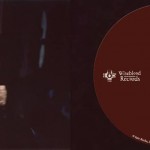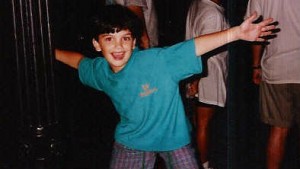My son Buster is away at school and he only rarely opens up emails from home because he knows if I have anything important to say (!) I’d call. So, I am not surprised that he only just got around to noting that I’d sent him a link to this post featuring scenes from “Battle of Fallen Angels,” the last episode of Cowboy Bebop, set to Johnny Cash singing “God’s Gonna Cut You Down.”
God’s Gonna Cut You Down
After watching the thing in the wee small hours of a morning, Buster wrote:
There have been so many stories about a hero who enters a situation believing that he is going to die. It is a common theme in westerns, and you want the protagonist cowboy to win and usually he does. But thats not where Cowboy Bebop takes it. One cannot just shrug off Spike’s death – it makes you mourn harder than with any other cowboy story. Why does Spike’s death hurt so much?
Obviously it hurts because Spike’s death means the end of the story. The show wouldn’t be the same if it was just Jet and Fey (if you remember Ein and Ed left a few episodes earlier) and there’s just something about about Fey that is too cold and unforgiving, something about Jet that is too good natured and mild to keep him interesting. Writers could try to build a good cop/ bad cop story between them, but without Spike there would be no heart. It may be safe to say that Spike rubbed off on Fey enough to change her, a little, but I’ll come back to that.
What makes Spike’s death different from the movie cowboys is that there’s always hope that the movie cowboy will survive, but you always knew Spike had to die. In a film, if the cowboy is fighting for a woman, he will have more of a chance of winning. But Julia was dead. Neither Spike nor Vicious could have her anymore. There was nothing more to fight.
Also if a cowboy has friends or family that he can return to, that can leave you hopeful, too. Not as much, mind you, because after the cowboy has his adventure its impossible for him to settle down. After you’ve done what you’re meant to do, how can you keep on living without purpose? That’s why they always ride into the sunset, it signifies the end of their lives, the end of their worth, and now they either die or try to start over and find new meaning. This is reflected too, in the end of Bebop, where the sun is rising after Spike’s death.
Remember, Spike had already died once and was revived and given a fake eye, signifying that now he has a new way to see the world. The whole series finale is Spike’s sunset. The Bebop is his horse, and he’s riding to find new meaning. And this is why they very rarely show you his past, because in the movies the cowboy never looks back.
But I’m ahead of myself, this is not why Spikes death is so sad. As we already said, his death is hard because the show ends, and – in the same way that we mourned the end of Firefly – we know we can no longer visit this magnificent world that they’ve created, this intensely interesting future is wrested from us when we all want to see more and more (maybe because we’re so clueless about our own futures).
The thing is, despite the fact that Spike is not the good guy, you like him. He’s real, he’s not just the heroic cowboy, he’s a person, a real person, he can be charming, embarrassing, disgraceful, heroic, cowardly, all the traits that you can find in a man.
This is what is so tantalizing; throughout the show they tell you that Spike and Vicious cannot coincide. Neither can live while the other lives, nor can they die without destroying the other. One sees that Vicious is simply a ruthless murderer, so he is more purely evil and from that perspective, Spike automatically becomes “the good,” even though he is very dark, himself – in fact Spike is in a sort of Purgatory. So, we have a study in degrees of darkness. Vicious is mostly evil but he has to have a little good. Spike is “troubled” good but he has a little evil in him, too. But the story makes it clear that they are also equals. When the equal good and bad clash, they cancel each other out.
Or maybe, that means that Vicious has the same potential to do good as Spike does. We start to see it in I believe “Jupiter Jazz I + II” when we see Vicious is somewhat kind to a comrade. But we never see Vicious enough to truly see what kind of man he is. We take it on faith that because Vicious and Spike are friends, Vicious must have some good in him, that perhaps the only reason that he wasn’t that good was because he did not have a new eye, or a new way to see the world. Or because he had not died and did not need a new reason for living.
And I think the thing that makes it so touching is Fey, the damsel that the cowboy cannot stay with; he needs to leave because he can’t settle down. Throughout the entire show there is an amount of romantic tension between Spike and Fey, even though Spike is still waiting for Julia. You see Spike having an effect on Fey, you see her start to loosen up, let her guard down, fall in love a little. And you see Spike forget about Julia once in a while too, when they do their shtick. I believe that in the end Spike did love Fey, but he couldn’t be hers while the remnants of his old life were still there.
I think that one of the many reasons that Spike went, knowing that he was going to die, was because he knew that he couldn’t settle down while the cowboy was still in him. He began to like his new eye, his new way of viewing the world. But he knew that it could never be really him until the fake eye was his real eye, and to do that, he needed to destroy the rest of him.
Also, Spike did realize that he still had a cowboy job to do; his sunset finally went under the mountains and he had to face the darkness of his past. Because in the end, even if you don’t look back at your past, that doesn’t mean that it isn’t following you. He knew it was there and he finished it.
The show ended with a sunrise, again. So much symbolism. His cowboy died in the darkness. When the sun rose again he was the man who could settle down. He no longer had that past lurking behind him. He was a new person and innocent. And that is why it is so sad to see this man die. He wasn’t the bad man that was capable of good, or the good man capable of bad. He was an innocent man.
And then he died. And we know that life just moved on when they panned out to the city. We know that Jet either returned to the force or heading into retirement, and Fey, with a broken heart probably closed herself off to feeling, after learning that if you open yourself up too much, it hurts.
There are all sorts of great themes in Cowboy Bebop, redemption being a big one. I could (and do) take Bebop into theological flights, but I enjoyed Buster’s take on it, too.










